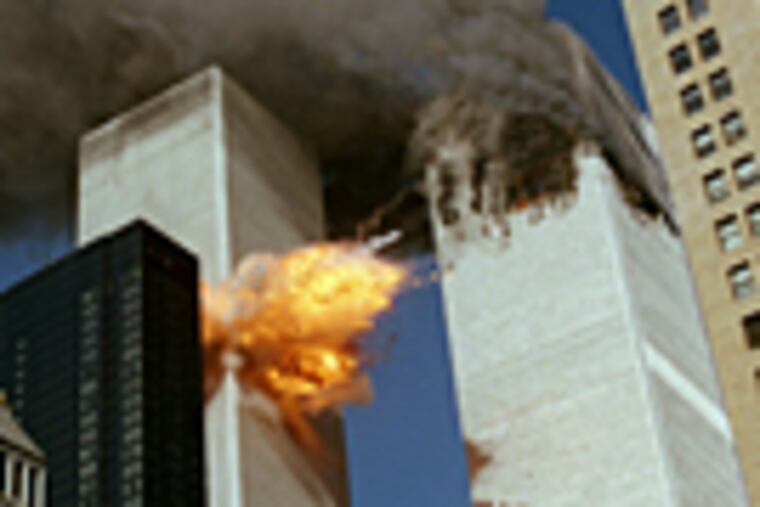New lawsuit alleges Saudis aided 9/11 attacks
Nearly 10 years to the day after the attacks of Sept. 11, 2001, a London-based insurance syndicate Thursday filed a new lawsuit against the government of Saudi Arabia in U.S. District Court in Johnstown, Pa., alleging that the Saudis helped finance and provided logistical support to Islamist terror groups.

Nearly 10 years to the day after the attacks of Sept. 11, 2001, a London-based insurance syndicate Thursday filed a new lawsuit against the government of Saudi Arabia in U.S. District Court in Johnstown, Pa., alleging that the Saudis helped finance and provided logistical support to Islamist terror groups.
Absent that support, the 9/11 attacks likely never would have happened, the lawsuit alleges.
The suit, filed on behalf of Lloyd's Syndicate 3500 by the Center City-based law firm Cozen O'Connor, opens a new front in the long-running litigation over the 9/11 hijackings. An earlier lawsuit, also filed by Cozen O'Connor, has met with mixed success: A federal appeals court in Manhattan found that the Saudi government could not be sued under U.S. law, but a number of charitable agencies affiliated with the Saudi government and financial institutions remain as defendants in that case.
Lawyers for the Saudi government have consistently denied that the Saudis or affiliated charities bear any responsibility for the 9/11 attacks.
The suit filed Thursday tracks in its broad outlines the allegations made in the first complaint, filed in 2003, which claimed that the Saudi government sponsored Islamist charities that, in turn, provided money and logistical support to al-Qaeda as it transformed itself from a regional terrorist organization in the 1990s to a global threat.
But this suit provides new details about the charities, alleging, among other things, that they supplied operational support and weapons for al-Qaeda fighters.
It also offers a far more detailed narrative on the emergence of radical Islam in Saudi Arabia, tracing the shaky hold of the Saudi royal family on power in the face of increasingly dissatisfied and radicalized Muslim clerics.
It cites as signal events the Saudi royal family's inability to put down a violent insurrection by radical Islamists in 1979 without the help of Pakistani military forces, and the widespread discontent among Islamists over the Saudis' decision to permit U.S. forces to be based in the country during the first Persian Gulf War.
Both events undermined the power of the royal family, which then was forced to buy off radical Islamists by supporting their causes, the new lawsuit alleges.
The suit, filed on behalf of an insurance syndicate that paid out $215 million in claims to various 9/11 victims on behalf of airline-security companies, aircraft manufacturers, airlines, and others, names as defendants not only the Saudi government, but also the Saudi High Commission for Relief of Bosnia and Herzegovina; the Saudi Joint Committee Relief Committee for Kosovo and Chechnya; National Commercial Bank, which has been linked by American officials to al-Qaeda money-laundering, and others.
"Each of the defendants named herein was a knowing and material participant in al-Qaeda's conspiracy to wage jihad against the United States," the lawsuit claims.
Cozen filed in 2003 its first lawsuit against the Saudi government, charities, and alleged terrorism financiers, citing findings by the U.S. government that the charities had established links with al-Qaeda operatives.
In 2005, a federal district judge in Manhattan ruled that the Saudi government could not be sued under a U.S. law that bars lawsuits against foreign governments for acts of terrorism unless the State Department had designated the government a terrorism sponsor.
Cozen and other law firms representing other plaintiffs in the litigation appealed that decision to the U.S. Court of Appeals for the Second Circuit, which upheld the lower-court judge.
The U.S. Supreme Court refused to hear the case in June 2009. Then-Solicitor General Elena Kagan had urged the court not to hear the case, saying the State Department had not designated Saudi Arabia as a terrorism sponsor. She added that the government's funding of Islamist charities was too far removed from terrorist groups to establish legal responsibility.
The latest suit seeks to make a much more pointed connection between Islamist charities that were designated terrorism financiers and the Saudi government. It alleges, for example, that the Saudis appointed a brother-in-law of Osama bin Laden, Mohammed Jamal Khalifa, to head offices of two charities, the Muslim World League and the International Islamic Relief Organization in the Philippines and Indonesia in 1989. Khalifa went on to help establish the Abu Sayyaf Group, later implicated in the beheading of an American and other killings.
To learn more about the previous suit filed against Saudi Arabia, including the court filings, go to www.philly.com/cozenEndText